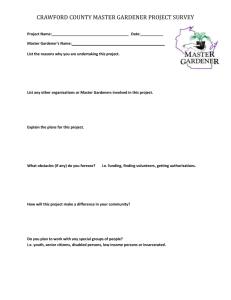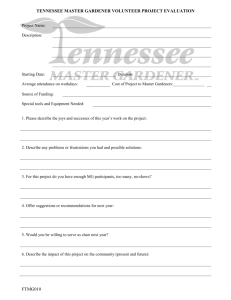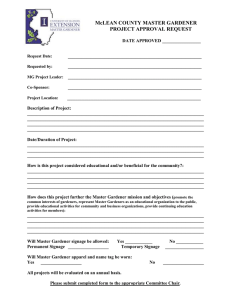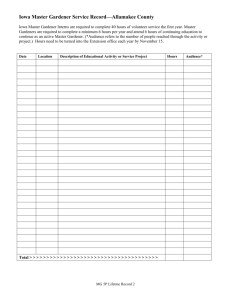/ccdms/downloads/2124.doc
advertisement
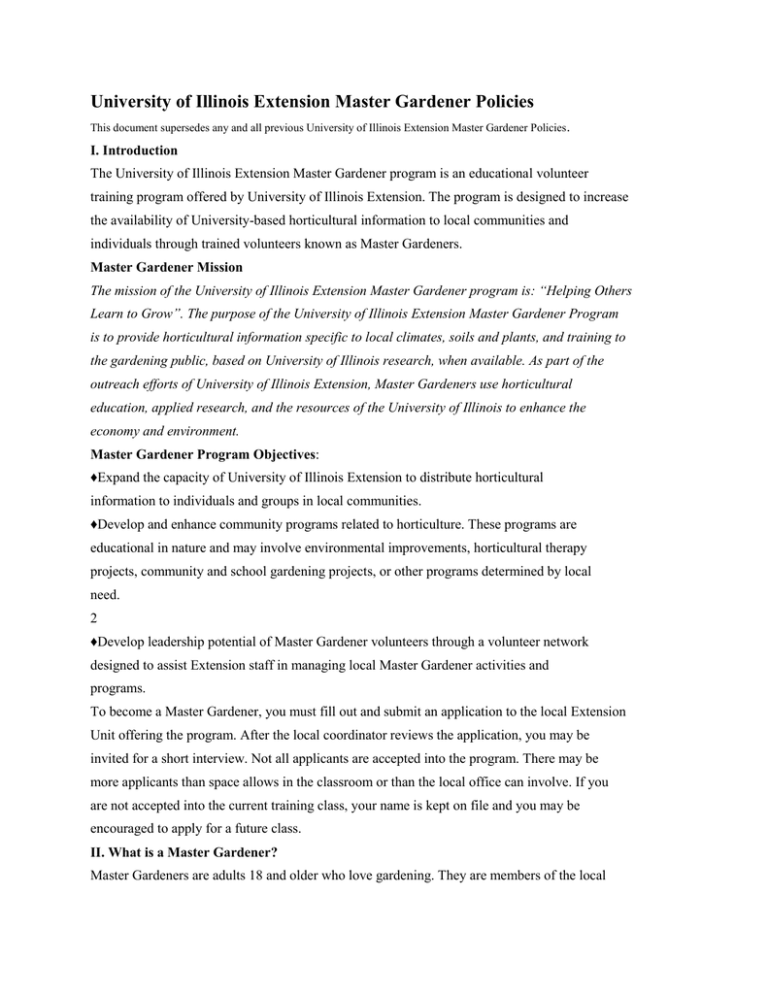
University of Illinois Extension Master Gardener Policies This document supersedes any and all previous University of Illinois Extension Master Gardener Policies . I. Introduction The University of Illinois Extension Master Gardener program is an educational volunteer training program offered by University of Illinois Extension. The program is designed to increase the availability of University-based horticultural information to local communities and individuals through trained volunteers known as Master Gardeners. Master Gardener Mission The mission of the University of Illinois Extension Master Gardener program is: “Helping Others Learn to Grow”. The purpose of the University of Illinois Extension Master Gardener Program is to provide horticultural information specific to local climates, soils and plants, and training to the gardening public, based on University of Illinois research, when available. As part of the outreach efforts of University of Illinois Extension, Master Gardeners use horticultural education, applied research, and the resources of the University of Illinois to enhance the economy and environment. Master Gardener Program Objectives: ♦Expand the capacity of University of Illinois Extension to distribute horticultural information to individuals and groups in local communities. ♦Develop and enhance community programs related to horticulture. These programs are educational in nature and may involve environmental improvements, horticultural therapy projects, community and school gardening projects, or other programs determined by local need. 2 ♦Develop leadership potential of Master Gardener volunteers through a volunteer network designed to assist Extension staff in managing local Master Gardener activities and programs. To become a Master Gardener, you must fill out and submit an application to the local Extension Unit offering the program. After the local coordinator reviews the application, you may be invited for a short interview. Not all applicants are accepted into the program. There may be more applicants than space allows in the classroom or than the local office can involve. If you are not accepted into the current training class, your name is kept on file and you may be encouraged to apply for a future class. II. What is a Master Gardener? Master Gardeners are adults 18 and older who love gardening. They are members of the local community who are interested in lawns, trees, shrubs, flowers, gardens, and the environment. a. Levels of Master Gardeners Master Gardener Trainee - a program participant from the time he/she is accepted into the program through completion of classroom training. Master Gardener Intern - a program participant from the time he/she graduates from classroom training with an average score of at least 80% on quizzes and exams, through the completion of 60 hours of volunteer service. This internship is normally completed within 12 months of the end of classroom training. However, interns may take 2 years to complete their internship upon agreement of the local extension unit Master Gardener coordinator. Anyone who fails to complete the volunteer service requirement does not become a University of Illinois Extension Master Gardener. 3 Certified (Active) Master Gardener - a Master Gardener Intern who has completed his/her initial 60-hour volunteer service requirement or a returning University of Illinois Extension Master Gardener. To maintain Certified University of Illinois Extension Master Gardener status requires a minimum of 30 hours of volunteer service and 10 hours of update education annually and is valid for one year. Active Master Gardeners are encouraged to pair with Master Gardener Trainees and Interns to help guide newcomers through a successful volunteer experience. Master Gardener Alumnus - a former University of Illinois Extension Master Gardener who successfully completed the 60-hour classroom training and the 60-hour internship, but who no longer maintains his/her annual active volunteer service and/or education update requirements. Return to active status after more than two years as a Master Gardener Alumnus will require additional training. Inactive Status / Leave of Absence – a former University of Illinois Extension Certified Master Gardener or Intern who is temporarily unable to fulfill Active Master Gardener requirements for health, family or other personal reasons. Participants may remain on leave of absence for one or two years at a time upon the approval of his or her local coordinator. Return to active status after more than two years as an inactive Master Gardener may require additional training. b. Use of the Master Gardener Title The title “University of Illinois Extension Master Gardener” is to be used only and exclusively in the University of Illinois Extension Master Gardener program in which the trained and certified Master Gardeners conduct educational programming and answer gardening questions in assistance to University of Illinois Extension. Master Gardeners are expected to identify themselves as such only when doing unpaid public service work in this University of Illinois 4 Extension-sponsored program. The titles are valid only when the volunteer is participating in the University of Illinois Extension Master Gardener program. When an individual ceases to actively participate, his or her designation as a University of Illinois Extension Master Gardener becomes void. Instead, he or she becomes a Master Gardener Alumnus. Certification as a Master Gardener is restrictive in that it is valid only when the individual is participating in a University Extension sponsored or endorsed program for the coming year. Those not continuing in the program will not be re-certified and should be aware that if they represent themselves as Master Gardeners, they are violating their original commitment. Conflicts of interest - A Master Gardener should not display credentials or give the appearance of being a University of Illinois Extension Master Gardener at a place of business unless that place is conducting an authorized University of Illinois Extension Master Gardener activity. It is improper to imply that University of Illinois Extension endorses any product or place of business. Master Gardeners must not use their title in any form of commercial advertisement. The Master Gardener program is a public service program established to provide unbiased information, and the title “Master Gardener” is to be used only when conducting unpaid volunteer work in the program. When Master Gardeners make public presentations on horticultural subjects, it is permissible for them to accept unsolicited gifts or be reimbursed for legitimate expenses incurred in conducting the class. However, it is inappropriate to seek pay for personal gain for speaking engagements conducted as a Master Gardener. Such speaker’s fees or honoraria are permissible when the fee is turned over to the local Extension Unit Office. Master Gardener identification – Name badges indicative of the level of the Master Gardener participant may be used. Temporary name badges are appropriate for Master Gardener Trainees. Master Gardener Interns and Active Master Gardeners should use official University of 5 Illinois Extension name badges to identify themselves as representatives of University of Illinois Extension while conducting programs as Master Gardeners unless anonymity for safety of the volunteer is important. Upon submitting their annual volunteer agreement, they will also be issued a University of Illinois Extension wallet I.D. card indicating their active status for the current year. Master Gardener apparel – Official University of Illinois Extension Master Gardener apparel may be ordered through the State Master Gardener Office, 1201 S. Dorner Dr., University of Illinois, Urbana, IL 61801. A group order for Master Gardener shirts, caps, visors, patches and other apparel is placed at least once per year. Master Gardener apparel must be in compliance with University of Illinois Extension logo guidelines. Annual Volunteer Agreement – All University of Illinois Extension Master Gardener Interns and Active Master Gardeners must sign an Annual Volunteer Agreement as part of their commitment to the program. A signed copy of the University of Illinois Extension Annual Volunteer Agreement will be on file in the respective University of Illinois Extension Unit Office. A sample agreement form is provided in the Appendix to these policies. III. Training a. Application Procedures - Recruitment of trainees will be based on pre-planning and an established need for local Master Gardener volunteer activities. Coordinators or the planning committee will develop and implement a plan to achieve full representation of the community. University of Illinois Equal Opportunity, Affirmative Action and program compliance policies must be followed. Screening of Applicants - Screening techniques, such as in-depth applications, inperson interviews, and reference checks, should be used to determine if candidates are 6 appropriate for the program. Sample forms are provided in the Appendix. Applicants should receive explanation of volunteer opportunities, particularly those that the individual will commit to for the internship. If these opportunities are not suitable to the candidate (i.e., conflicts with schedule, no interest in offered program areas, etc.), then the candidate should be advised to reapply to the program again in the future. b.Core Course Classroom Training Course topics – University of Illinois Extension Master Gardener Core Course training consists of a minimum of 60 hours of classroom instruction based on the Illinois Master Gardener Manual. Exact topics presented may vary due to local needs. However, all programs will include sessions on the following topics: Introduction to the Master Gardener program and Extension Botany Soils Plant Diseases Horticultural Insects Integrated Pest Management Small Fruits Tree Fruits Vegetable Gardening Flower Gardening Turf Woody Ornamentals Additional topics covered in the Illinois Master Gardener Manual, which may be part of the core course are: Propagation Diagnosis Herbs Nuts Bulbs Houseplants Roses Landscaping 7 Topics not covered in the Illinois Master Gardener Manual may also be part of core course training, provided approval of the topic and instructor is obtained from the State Master Gardener Office. Attendance – Master Gardener Trainees are expected to attend all training sessions. In the event a training session must be missed, it is the responsibility of the trainee to make arrangements for making up the missed session. Quizzes and Exams – A comprehensive open book exam on all subject matter in the course will be given. In addition to the comprehensive final exam, a weekly quiz on the topic(s) for that week will be given. Exams and quizzes will be submitted to the local Master Gardener coordinator or designated Master Gardener team for grading. Tests with corrected answers should be returned to the individuals and a period of class time scheduled to review the exam and the answers. Trainees that achieve 80 percent or higher cumulative average at the end of the classroom instruction will receive a University of Illinois Master Gardener Intern certificate and will continue on to the internship portion of the program. A database of suitable exam questions will be available from the State Master Gardener Office. It will include questions from the former exams as well as contributions from local coordinators. Updates will be made periodically. Contributions, with answers, are welcome and should be submitted to the State Master Gardener Office. Course fees – Master Gardener course fees are set by local units offering the training. The fee should include the cost of the Illinois Master Gardener Manual, which is required for each participant in the program. Participants may chose whether they prefer the print version, 8 CD-ROM version, or both versions of the manual. The course fee should also account for additional training costs such as meeting room rental fees, and photocopying costs. In instances where a course applicant indicates he or she prefers not to complete the volunteer internship portion of the course, or if through the interview process the selection team questions the volunteer commitment of the applicant, a non-volunteer option for training is available at a higher fee. Those selecting this option will not become certified University of Illinois Extension Master Gardeners. This option may be attractive to commercial horticulturists who would like the information from the course, but don’t have the time to volunteer in the program. The professional-horticulture-option training fee is $250 in addition to the cost of training materials. Continuing Education – Certified University of Illinois Master Gardeners are only those who have completed their classroom training and internship. Certification is limited to one year from the time of granting, but is renewable by remaining active as a Master Gardener volunteer. To be considered an active Master Gardener, you must remain current in annual educational update and volunteer service requirements set by the local Master Gardener program, or, in the absence of local requirements, follow the state minimum requirements of 30 hours of volunteer service and 10 hours of approved educational updates. Approved educational updates are such things as the State Master Gardener Conference, local Master Gardener update sessions and University of Illinois Extension sponsored seminars and short courses. Credit horticulture or plant science classes, or other horticultural classes must be pre-approved by the local Master Gardener Coordinator. State Master Gardener Conference – Each year a State Master Gardener conference will be held. The conference is held at different locations around the state, with local Master Gardener groups acting as hosts. Program content for the conference, is coordinated by the State 9 Master Gardener Office. Attending classes and workshops at the State Master Gardener Conference will more than fulfill the minimum continuing education requirement. Multi-state and International Master Gardener Conferences – In odd-numbered years, an International Master Gardener Conference is held in the U.S. or Canada. University of Illinois Extension Master Gardeners will be informed of the dates and program through the state Master Gardener newsletter. Attending classes and workshops at the International Master Gardener Conference will count towards continuing education requirements. Continuing education opportunities are also available at multi-state Master Gardener Conferences. The state Master Gardener newsletter will be the official notification medium for these training opportunities. Local and regional updates – Many local Master Gardener groups plan periodic informational meetings and educational updates for active Master Gardeners and Interns. These also apply toward continuing education credits. IV. Volunteering in the Master Gardener Program a. Volunteer Opportunities and Requirements Types of volunteer work eligible - Volunteers are required to discuss with their local Master Gardener coordinator all planned activities prior to conducting the program. This information is essential for liability coverage. Generally, volunteer work is done in your local community, but need not be limited to local programming efforts. While the extension unit office is the center of Master Gardener programming, some volunteer work may be done outside the extension office. Many projects may involve interaction with parks and recreation departments, nursing homes, schools, county or city agencies, and other civic organizations. 10 Educational Efforts - Educational efforts are those activities or programs in which the Master Gardener educates the public. This includes presentations at demonstration sites; presentations at fairs, booths; plant clinics; and educational presentations to identified audiences, such as garden clubs, school groups, homeowner associations, and church groups. This also includes training of other volunteers, such as other Master Gardeners, Boy Scouts, civic groups, or other identified groups of volunteers, to assist them in delivering a program. Work to construct or develop a site used for educational programming, such as a landscape demonstration garden, qualifies as educational efforts. Educational efforts include the time spent planning, implementing, and reporting on educational efforts. As a good rule-of-thumb in determining which activities are appropriate educational programming, ask the questions, "Is the program educational in nature?" and "Does this activity contribute to the goals and mission of the local Extension unit?" Administrative Efforts - Administrative volunteer efforts that count towards volunteer time include conducting general Master Gardener business meetings; working on a Master Gardener newsletter; communication efforts, such as telephone trees; and any other activities that maintain the Master Gardener Program. Non-educational Programming - Design, installation, upkeep, and maintenance of public or demonstration gardens without the inclusion of educational activities (such as active demonstrations, hands-on workshops, etc.) must be approved and documented by an Extension Educator or Unit Leader as contributing to the goals and mission of the local Extension program. Non-educational programming may also include travel time and other non-work time necessary to do the job of volunteering. 11 Training Time - Time spent in training, educational conferences or other settings that qualify as continuing education training should not be counted as volunteer time. Instances where the Master Gardener is the recipient of information or training rather than the presenter of information count as continuing education or re-certification time. Reporting volunteer activities – Record the date (month/day/year) when volunteer activities took place. Specifically list what the volunteer did during the period of time being reported. It is helpful to keep a file of volunteer job descriptions, contracts, letters, reports, newspaper clippings and pictures of events, exhibits and displays, etc. to be used in writing annual reports and impact statements. Record the number of people that a Master Gardener has impacted by the particular efforts being reported, including group demographic information. Individual Master Gardener report summaries for the previous year (name of Master Gardener, hours of service, and hours of continuing education for the year) must be sent to the State Master Gardener Office annually by the end of January. A listing of Master Gardeners who have signed an Annual Volunteer Agreement for the coming year will also be submitted to the state office by the end of January. This information is needed to re-certify the Master Gardener for the following year, and to issue a University of Illinois Extension Master Gardener identification card for the upcoming year. Master Gardeners for whom annual report summaries and Annual Volunteer Agreements are not received will be removed from the active Master Gardener rolls and will be dropped from the state newsletter mailing list. Master Gardener Transfers - Master Gardeners who have completed their classroom training and internship in Illinois, and received a positive recommendation from their local Master Gardener coordinator prior to moving to another part of the state are eligible to become volunteers in the locale of their new residency. However, they may be required to take additional course work also required of all local Master Gardeners in the new locality and will be subject to 12 the guidelines of the new locale. Master Gardeners who have not completed their internship prior to moving will be required to complete their internship with their new unit before becoming certified Master Gardeners. Master Gardeners moving from out-of-state as well as returning Master Gardeners (i.e., someone who trained in Illinois, moved away, and is returning to Illinois) may be required to complete the entire Master Gardener training prior to volunteering in Illinois, depending on their demonstrated knowledge and skills in this geographic area. Generally, active Master Gardeners from neighboring states upon recommendation from their previous local Master Gardener coordinator can be accepted without need for further demonstration of horticultural knowledge. For those Master Gardener transfers or inactive former Master Gardeners away from the program for 2 years or more, retraining is required. b. Performance Evaluation Master Gardener volunteers are entitled to a periodic performance review from their immediate supervisor. The review process should include oral and written feedback on job performance, and include opportunity for the volunteer to assess his/her supervisor and the satisfaction level of the volunteer jobs he/she has been assigned. Volunteers dissatisfied with current job assignments may request reassignment to different volunteer jobs that meet local extension programming needs and that adhere to Extension program priorities. Due Process for Volunteer Grievance Procedures – Each volunteer has the right to bring complaints to the attention of the local Master Gardener coordinator, Extension Educator and/or the Unit Leader with the assurance that they will receive a review and be accorded fair and equitable treatment. 13 Purpose of Grievance Procedure – Extension volunteers may use the grievance procedure to address complaints, which relate to the terms and conditions of volunteer service. This grievance procedure covers oral and written reprimands, reassignment, termination of volunteer service, and similar volunteer personnel matters. The grievance procedure is an informal in-house means of addressing volunteer complaints. Grievances will not be processed which are or become the subject of any other administrative or judicial proceeding. Each Unit Leader or other Extension academic staff member responsible for volunteer staff has an obligation to make every effort to resolve volunteer relations problems as they arise. Unit Level Grievances – When a volunteer has a grievance about volunteer personnel actions taken at the unit level, the procedures below are recommended. 1. Informal Step: Oral Discussion with Unit Extension Professional. A volunteer may make a complaint informally to the Unit Leader or academic staff member. The Unit Leader or designee should initiate discussion, considerations, and resolution within ten (10) working days from the date of the complaint. The Unit Leader or designee should give a response to the volunteer within ten (10) working days of the date of the discussion. Informal resolution is encouraged and a written grievance should be filed only after informal resolution has proven unsuccessful. 2. Formal Step One: Written Grievance to University of Illinois Extension Regional Director. If the volunteer is not satisfied with the informal step, the volunteer may present a formal written grievance to the Regional Director within ten (10) working days of the date of the oral discussion and response. The written grievance should be clear, concise, and specifically detail what action is requested to resolve the grievance. The Regional Director or his/her designee will arrange for a meeting with the volunteer. The Regional Director or his/her designee will investigate the causes of the grievance and, if 14 necessary, will conduct a hearing regarding the issues of the grievance. A minimum action is that the Regional Director or his/her designee must discuss the issues with the parties involved in the complaint. The Regional Director or his/her designee will provide a written response to the grievant within twenty (20) working days of the receipt of the written grievance. A copy of the written grievance and the written response shall be furnished to Associate Dean for Extension and Outreach and Dean of the College of Agricultural, Consumer and Environmental Sciences (ACES). 3. Formal Step Two: Final Decision by Associate Dean for Extension and Outreach. If the volunteer is not satisfied with the Formal Step One decision, a written request for a review may be made to the Associate Dean of Extension and Outreach. The volunteer shall request the review within ten (10) working days of the step two written response receipt. The Associate Dean or his/her designee will make a complete and thorough review of the written record, request any additional information, or conduct any further investigation he/she feels necessary. He/she will furnish a written decision to the volunteer within twenty (20) working days from the date of receipt of the grievance. A copy of the written grievance and written response shall be furnished to the Dean of the College of ACES. The decision of the Associate Dean for Extension and Outreach shall be final in all grievances. Grounds for dismissal from Master Gardener program - A University of Illinois Extension Master Gardener can be relieved of the title and privileges at any time, at the discretion of the local Master Gardener coordinator or Extension Educator and Unit Leader, in the event that the Master Gardener demonstrates actions that are in conflict with the mission, purpose and objectives of University of Illinois Extension. Examples of conflict include, but are not limited to, misuse of the Master Gardener title and failure to comply with University of Illinois Master Gardener program policies. 15 Procedure for dismissal – The following steps will be followed in removing a volunteer. 1. The Unit Leader will notify the volunteer in writing listing specific concerns and/or policy infractions in question. The notice should also include the immediate and/or possible outcomes including possible removal from the volunteer role. 2. The Unit Leader will provide an opportunity for the volunteer to respond to this notice and provide any additional or contradictory information pertinent to the situation. 3 The Unit Leader in consultation with any appropriate unit advisory group will review the original complaint and other evidence and decide on the action to be taken. The decision will then be conveyed to the volunteer in writing within ten (10) days of the decision. Appeals of the decision follow the due process for volunteer grievance procedures described above. The Unit Leader should consult with the Regional Director and other appropriate Extension administrators any time there is a serious incident involving a volunteer. V. Recognition and Awards Certificates Upon satisfactory completion of the classroom portion of Master Gardener training, a University of Illinois Extension Master Gardener Intern certificate is awarded to the participant. After completion of the 60-hour internship, the Master Gardener Intern becomes a certified University 16 of Illinois Extension Master Gardener and is awarded a Master Gardener certificate. Certificates may be presented at an annual graduation or volunteer recognition ceremony In succeeding years, University of Illinois Extension Master Gardeners who remain active by keeping their continuing education and volunteer service requirements current may be awarded a “Years of Service” certificate. State Awards State level Master Gardener awards are given annually at the state Master Gardener Conference. Awards are based on nominations submitted by local Master Gardener coordinators, Extension Educators and/or Unit Leaders. The State Outstanding Master Gardener award is based on the following criteria: ♦ Nominee must be a currently active University of Illinois Extension Master Gardener. ♦ Nominee must have completed at least 120 hours of Master Gardener volunteer service beyond the required 60-hour internship (180 total). ♦ A maximum of 2% of statewide active Master Gardeners will be recognized with this award annually. Nominees for the Sustained Excellence Award must: ♦ Be a currently active University of Illinois Extension Master Gardener. ♦ Have been active in Illinois Master Gardener program at least 3 years beyond internship (a minimum of 4 years total). ♦ Be a previous State Outstanding Master Gardener award recipient. ♦ Have completed at least 300 hours of Master Gardener volunteer service since receiving the State Outstanding Master Gardener award (a minimum of 480 hours total). 17 VI. Program Compliance a. Equal Opportunity Statement It is the policy of the University of Illinois not to engage in discrimination or harassment against any person because of race, color, religion, sex, national origin, ancestry, age, marital status, disability, sexual orientation, unfavorable discharge from the military, or status as a disabled veteran or a veteran of the Vietnam era and to comply with all federal and state nondiscrimination, equal opportunity and affirmative action laws, orders and regulations. This nondiscrimination policy applies to admissions, employment, access to and treatment in the University programs and activities. This policy means that the Master Gardener program is open to all regardless of status or affiliation. Similarly, all Master Gardener program offerings must be open to all who wish to participate regardless of status or affiliation. Reasonable accommodations for those with special needs must be made to ensure equal access to programs. Instances of discrimination or harassment are grounds for dismissal and de-certification from the Master Gardener program. b. Affirmative Action University of Illinois Extension is an affirmative action organization and actively recruits minorities and women in employment and programs. It is the responsibility of each employee to participate in the University of Illinois Affirmative Action plan by assisting in recruitment and by helping to create an open, multicultural environment. Supervisory employees will follow affirmative action guidelines in selecting and supervising staff and will be evaluated on results achieved. c. Americans with Disabilities Act 18 Extension offices must make their programs available to the disabled. These guidelines should be followed: 1) If Extension offices are not accessible to the disabled every effort will be made to provide services in an alternative location. 2) Consider the accessibility of meeting rooms that are used to conduct classes and meetings. Choose only accessible rooms if at all possible. 3) It is not mandatory to remodel public buildings if the services can be provided elsewhere; however, if remodeling is to be done, the remodeled areas must be accessible to the disabled. 4) All new construction must be accessible to the disabled. 5) No interested parties may be denied services because of disability unless it is impractical to accommodate their needs or if accommodating them would create an unacceptable health or safety risk. Every reasonable effort must be made to design and deliver Extension programs that encourage participation of individuals with special needs. VII. Setting and Amending Master Gardener Policies The State Master Gardener office has final authority in setting and amending statewide Master Gardener policies. Recommendations for policy changes are directed through the State Master Gardener Advisory Committee that has the following purposes: ♦ Serve as advisory counsel to state level Master Gardener administration. ♦ Encourage equitable distribution of state Master Gardener resources. ♦ Recommend minimum standards for University of Illinois Extension Master Gardener core course training. ♦ Strengthen state Master Gardener education and training. ♦ Increase awareness of University of Illinois Extension Master Gardener Programs. ♦ Support an annual University of Illinois Extension Master Gardener conference. ♦ Recommend policies and guidelines for University of Illinois Extension Master 19 Gardener programs while recognizing local needs. The University of Illinois Master Gardener Advisory Committee consists of: ♦ Two (2) certified University of Illinois Extension Master Gardeners from each of the five (5) University of Illinois Extension regions. If no certified Master Gardener applicants are available from a given region, a Master Gardener Intern may represent that region. ♦ Two (2) extension staff members from each of the five (5) University of Illinois Extension regions. ♦ One (1) representative from the University of Illinois Extension Master Gardener program at Chicago Botanic Garden. ♦ The state Master Gardener Coordinator and one (1) state staff member. Guest Master Gardeners and University of Illinois Extension staff are welcome to attend State Advisory Committee meetings as non-voting observers. Official notification of state Master Gardener policy changes will be communicated through the state Master Gardener newsletter. Additionally, all unit leaders and horticulture extension educators will be notified directly via e-mail or direct mailing of any policy changes. Appendices a. University of Illinois Extension Master Gardener Service Record b. University of Illinois Extension Master Gardener Annual Volunteer Agreement c. University of Illinois Extension Master Gardener Application Adopted November 15, 2000, Revised September 2002 20
